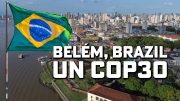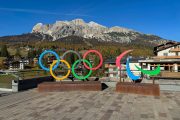“Maintaining biodiversity is related not only to direct conservation measures, but also to pursuing poverty reduction and human development in ways which are sustainable. This is of critical importance to the success of the post-2015 development agenda,” declared Helen Clark, Administrator of the UN Development Programme (UNDP) at the opening of the High Level segment of the of the 12th meeting of the Conference of the Parties to the Convention on Biological Diversity (CBD COP-12) in Pyeongchang, Republic of Korea.
“Human survival and wellbeing depend heavily upon the earth’s biodiversity. Biodiversity loss not only has serious implications for our natural environment: it also undermines our livelihoods, health, and food and water security,” Clark said in her remarks to the High-Level segment, which ran through October 16.
As we reported on October 20, the 3-week-long UN conference, which concluded on October 17, is intended as a major boost to the UN’s draconian Agenda 21 and is rife with proposals for global wealth redistribution, more restrictive environmental regulation, and increased regimentation of all human society.
According to the UN’s Miss Clark, biodiversity protection will be crucial to the achievement of the sustainable development goals (SDGs) now being developed by the UN General Assembly. The SDGs are being crafted to replace, in 2015, the UN’s Millennium Development Goals (MDGs) that were introduced at the UN’s 2000 Millennium Summit. So far, the UN’s “development” architects have announced two “stand-alone” goals for biodiversity: one on oceans; and another on terrestrial ecosystems. But, as we noted in our previous story (linked above), the UN globocrats have also proposed including biodiversity targets in other goals, such as those on food security, poverty eradication, nutrition, health, agriculture, water, sanitation, and much more.
“Tackling poverty and creating economic opportunity goes hand in hand with protecting biodiversity” Miss Clark said. “It will require leaders to see the links between the complex challenges we face and the solutions.”
Miss Clark was an appropriate UN official to oversee the socialistic bent of the biodiversity conference. She has been a leading political figure for several decades in the Socialist International, the global organization of socialist and communist parties that includes around 170 parties, including many that are in control of national governments. She served three terms as prime minister of New Zealand (1999-2008) and took over as Administrator at the UNDP, the third-highest office at the UN, in 2009. According to the online New World Encyclopedia:
She represented the New Zealand Labour Party at the congresses of the Socialist International and of the Socialist International Women in 1976, 1978, 1983 and 1986, at an Asia-Pacific Socialist Organization Conference held in Sydney in 1981, and at the Socialist International Party Leaders’ Meeting in Sydney in 1991.
The Socialist International, operating as a body, and with its many members operating in their national leadership positions within the UN General Assembly, the UN’s agencies, the World Bank, the International Monetary Fund, and many other regional entities, constitute an enormous force working for world socialism and world government.
It is worth noting that at its 1962 Congress in Oslo, Norway, the Socialist International plainly declared:
The ultimate objective of the parties of the Socialist International is nothing less than world government…. Membership of the United Nations must be made universal.
The Socialist International has not always been as candid in expressing this objective, but the policies and programs it invariably pushes leave no doubt that it still adheres to the commitment expressed in that 1962 declaration.
The Executive Director of the Convention on Biological Diversity (CBD), Braulio Ferreira de Souza Dias, stressed that bringing biodiversity into the public discourse is essential to make progress. “We have to promote the understanding that biodiversity underpins sustainable development for economic and social well-being,” Dias said, in a promotion for the newly released UN study, Global Biodiversity Outlook 4.
As noted in our previously mentioned report on the conference, the concluding documents especially stress the need for “resource mobilization,” which is UN-speak for putting the squeeze on taxpayers for ever more funding. The “Resource Mobilization Draft decision submitted by the Chair of Working Group I” at the conclusion of the conference, praised some of the UN’s most corrupt and abusive agencies and called for them to “upscale” their work — presumably with increased funding from the “resource mobilization” drive. The Draft states that the CBD Working Group,
Notes with appreciation the work of relevant international organizations that support the work on resource mobilization and the programme of work on incentive measures, such as the Food and Agriculture Organization of the United Nations, the United Nations Conference on Trade and Development, the United Nations Development Programme, the United Nations Environment Programme and its initiative on the Economics of Ecosystems and Biodiversity, the Organisation for Economic Co-operation and Development, the International Union for Conservation of Nature (IUCN), the World Trade Organization, as well as other international organizations and initiatives, and invites these organizations and initiatives to continue and further upscale this work, and to provide capacity-building and technical support for implementing the modalities and milestones for Aichi Biodiversity Target 3.
As just one example worth citing, the United Nations Conference on Trade and Development (UNCTAD) praised above, was the subject of a recent exposé by The New American’s Alex Newman.
As Newman points out, a new UNCTAD report calling for an “international “New Deal’” is an undisguised appeal for global, centralized Big Government.
Related articles:
UN Biodiversity Conference Pushes Global Resdistribution, Restriction, Regimentation
UN Calls for National Water “Affordability Standard” in America
Who Will Control Your Internet?
The United Nations: On the Brink of Becoming a World Government
Your Hometown & the United Nations’ Agenda 21
Socialist International in Copenhagen: “Birth of Global Governance”




